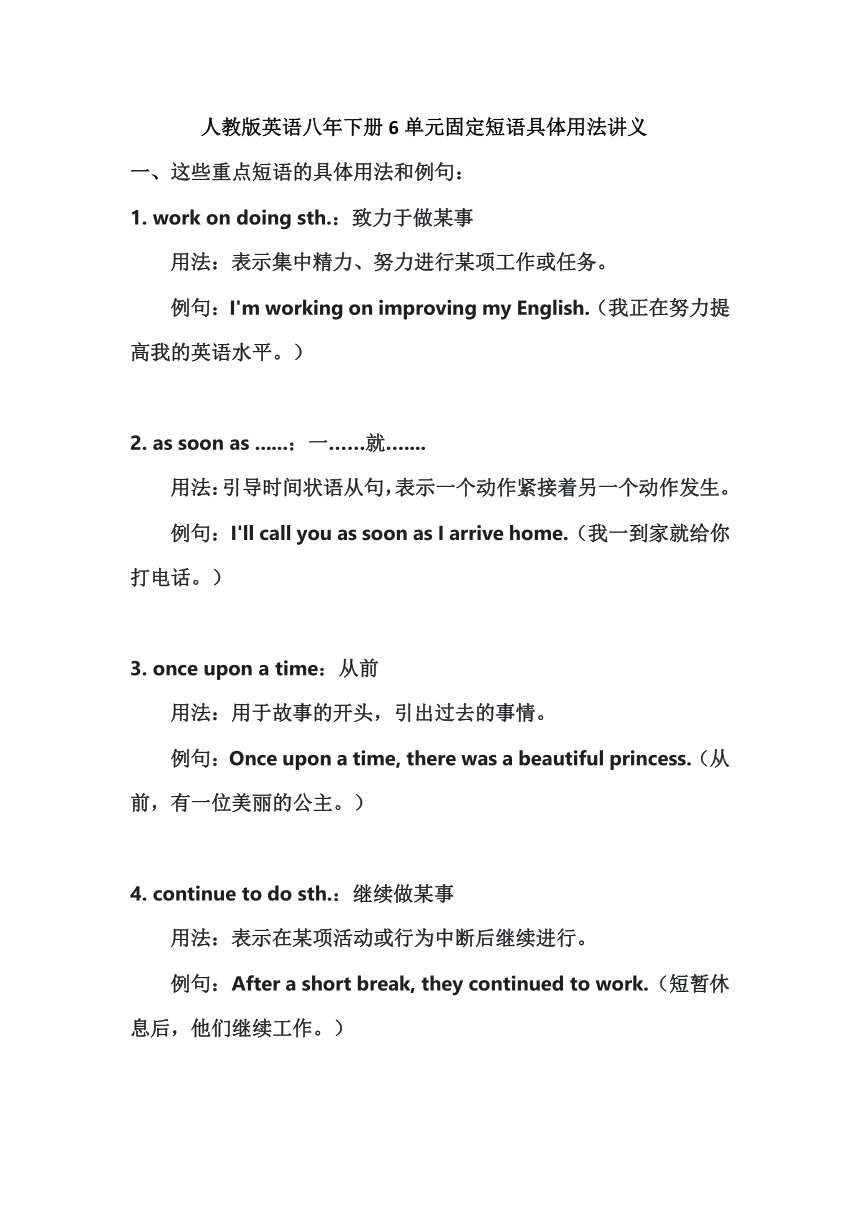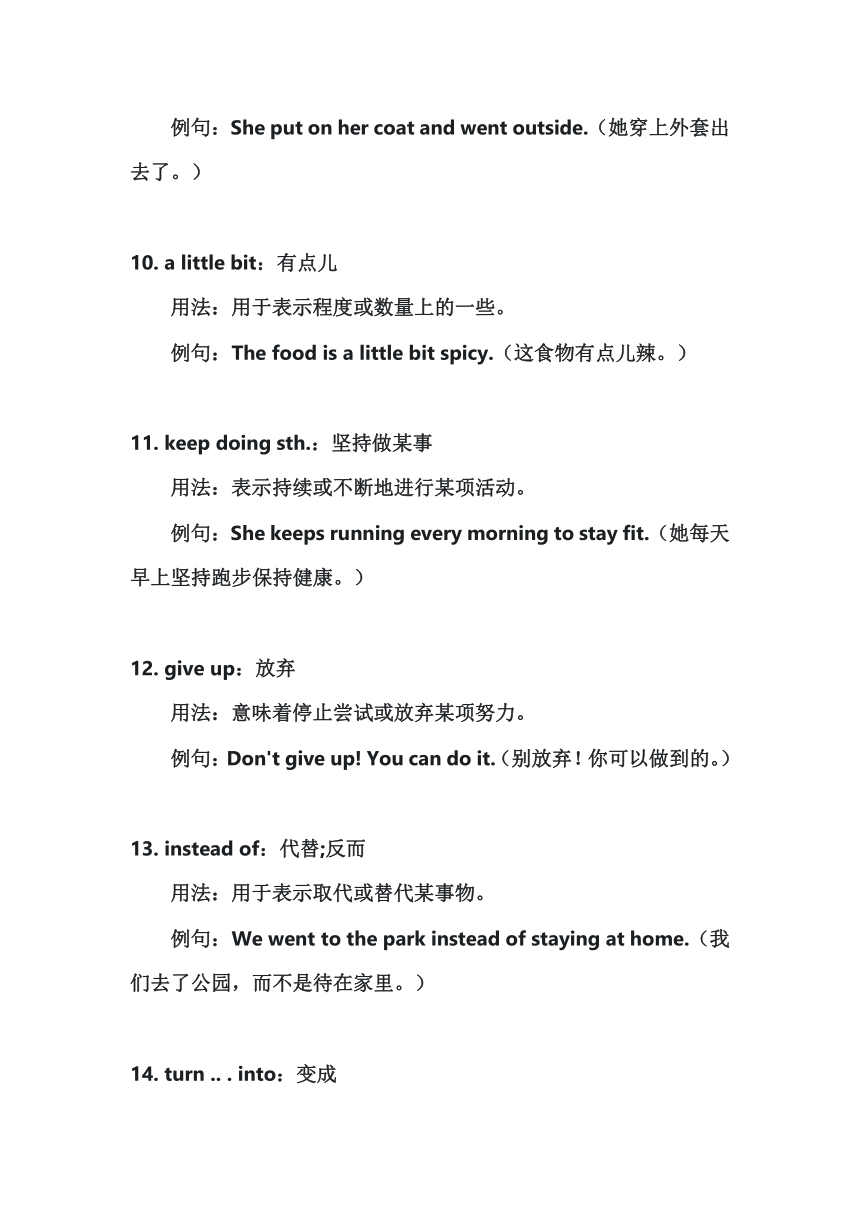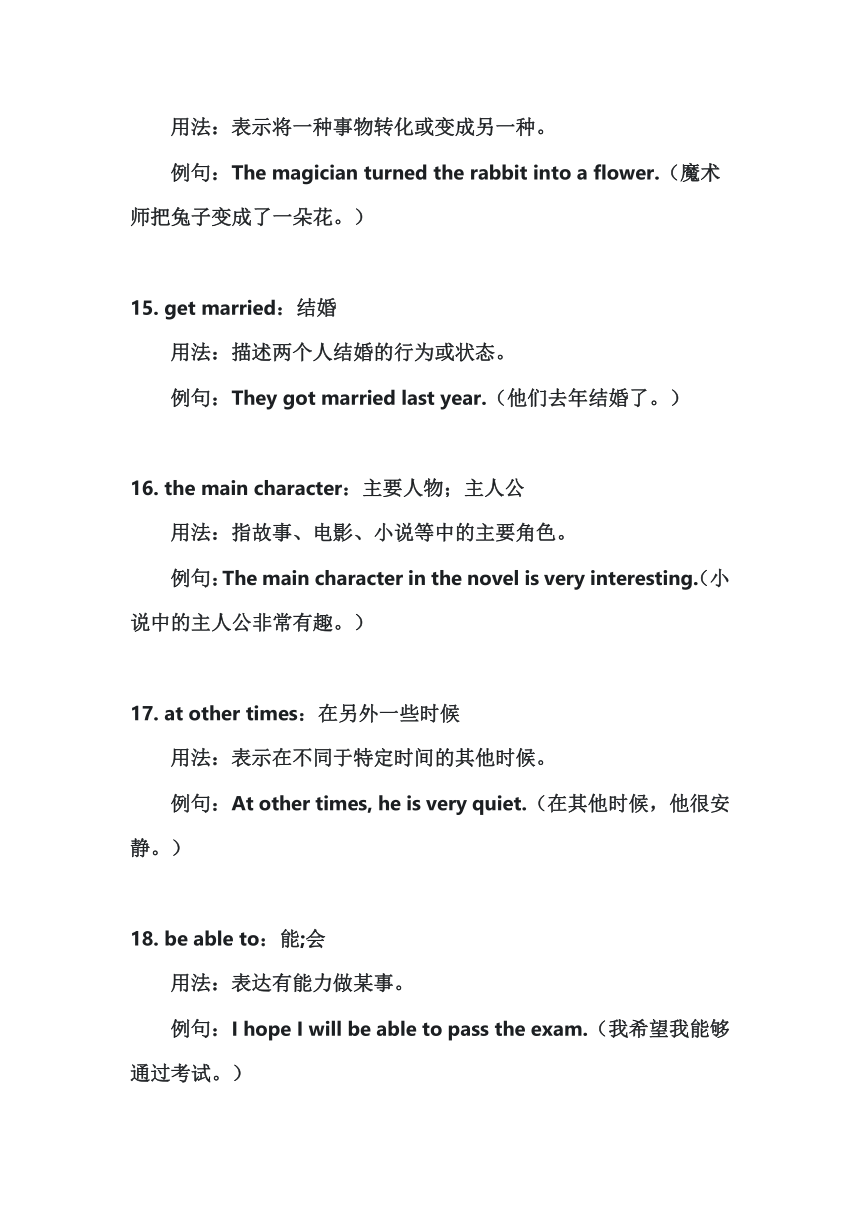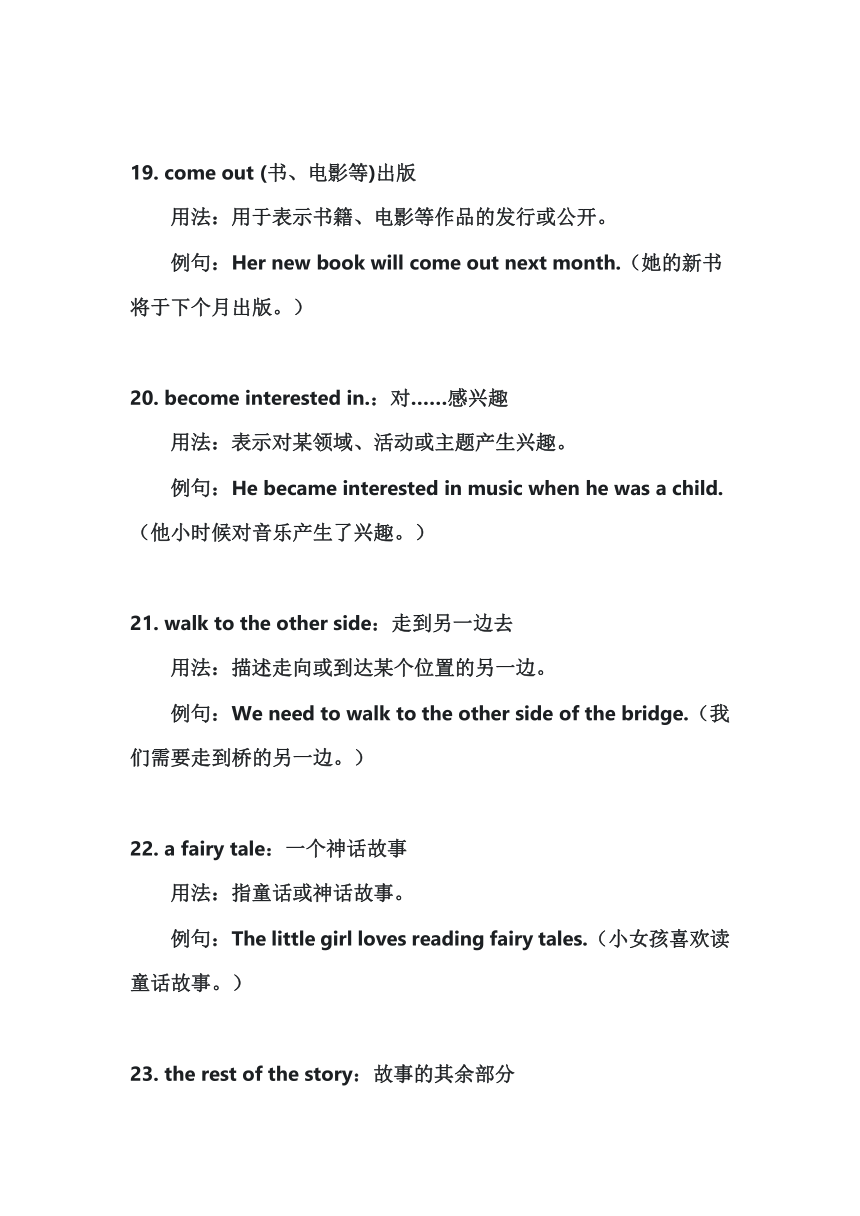Unit 6 An old man tried to move the mountains固定短语具体用法讲义
文档属性
| 名称 | Unit 6 An old man tried to move the mountains固定短语具体用法讲义 |  | |
| 格式 | docx | ||
| 文件大小 | 28.3KB | ||
| 资源类型 | 教案 | ||
| 版本资源 | 人教新目标(Go for it)版 | ||
| 科目 | 英语 | ||
| 更新时间 | 2024-02-07 19:15:24 | ||
图片预览





文档简介
人教版英语八年下册6单元固定短语具体用法讲义
一、这些重点短语的具体用法和例句:
1. work on doing sth.:致力于做某事
用法:表示集中精力、努力进行某项工作或任务。
例句:I'm working on improving my English.(我正在努力提高我的英语水平。)
2. as soon as ......:一……就…....
用法:引导时间状语从句,表示一个动作紧接着另一个动作发生。
例句:I'll call you as soon as I arrive home.(我一到家就给你打电话。)
3. once upon a time:从前
用法:用于故事的开头,引出过去的事情。
例句:Once upon a time, there was a beautiful princess.(从前,有一位美丽的公主。)
4. continue to do sth.:继续做某事
用法:表示在某项活动或行为中断后继续进行。
例句:After a short break, they continued to work.(短暂休息后,他们继续工作。)
5. make sth. happen:使某事发生
用法:强调通过某种行动或努力导致某事发生。
例句:She made sure the party happened without any problems.(她确保聚会顺利进行。)
6. try to do sth.:试图做某事
用法:表达努力尝试去做某事,但不一定成功。
例句:He tried to open the door, but it was locked.(他试图打开门,但门是锁着的。)
7. the journey to sp.:......之旅
用法:描述到某个地方的旅行或行程。
例句:The journey to the top of the mountain was very challenging.(到山顶的旅程非常具有挑战性。)
8. tell the/a story:讲故事
用法:指讲述一个故事或叙述一件事情。
例句:Grandma always tells us interesting stories.(奶奶总是给我们讲有趣的故事。)
9. put on:穿上
用法:表示穿上衣服或戴上其他物品。
例句:She put on her coat and went outside.(她穿上外套出去了。)
10. a little bit:有点儿
用法:用于表示程度或数量上的一些。
例句:The food is a little bit spicy.(这食物有点儿辣。)
11. keep doing sth.:坚持做某事
用法:表示持续或不断地进行某项活动。
例句:She keeps running every morning to stay fit.(她每天早上坚持跑步保持健康。)
12. give up:放弃
用法:意味着停止尝试或放弃某项努力。
例句:Don't give up! You can do it.(别放弃!你可以做到的。)
13. instead of:代替;反而
用法:用于表示取代或替代某事物。
例句:We went to the park instead of staying at home.(我们去了公园,而不是待在家里。)
14. turn .. . into:变成
用法:表示将一种事物转化或变成另一种。
例句:The magician turned the rabbit into a flower.(魔术师把兔子变成了一朵花。)
15. get married:结婚
用法:描述两个人结婚的行为或状态。
例句:They got married last year.(他们去年结婚了。)
16. the main character:主要人物;主人公
用法:指故事、电影、小说等中的主要角色。
例句:The main character in the novel is very interesting.(小说中的主人公非常有趣。)
17. at other times:在另外一些时候
用法:表示在不同于特定时间的其他时候。
例句:At other times, he is very quiet.(在其他时候,他很安静。)
18. be able to:能;会
用法:表达有能力做某事。
例句:I hope I will be able to pass the exam.(我希望我能够通过考试。)
e out (书、电影等)出版
用法:用于表示书籍、电影等作品的发行或公开。
例句:Her new book will come out next month.(她的新书将于下个月出版。)
20. become interested in.:对……感兴趣
用法:表示对某领域、活动或主题产生兴趣。
例句:He became interested in music when he was a child.(他小时候对音乐产生了兴趣。)
21. walk to the other side:走到另一边去
用法:描述走向或到达某个位置的另一边。
例句:We need to walk to the other side of the bridge.(我们需要走到桥的另一边。)
22. a fairy tale:一个神话故事
用法:指童话或神话故事。
例句:The little girl loves reading fairy tales.(小女孩喜欢读童话故事。)
23. the rest of the story:故事的其余部分
用法:用于指故事中除了已经提到的部分之外的其他部分。
例句:I can't wait to hear the rest of the story.(我迫不及待地想听到故事的其余部分。)
24. leave sb. to do sth.:让某人做某事
用法:允许或委托某人去做某事。
例句:Leave me to finish this work by myself.(让我自己完成这项工作。)
25. make a plan to do sth.:筹划/计划做某事
用法:表示制定计划来做某事。
例句:We need to make a plan to finish the project on time.(我们需要制定计划按时完成项目。)
26. go to sleep:去睡觉
用法:表示进入睡眠状态。
例句:It's time to go to sleep. Good night!(是时候睡觉了。晚安!)
27. lead sb. to sp.:把某人领到某地
用法:指引或带领某人前往某个地方。
例句:The guide led us to the museum.(导游带领我们去了博物馆。)
28. get lost:迷路
用法:表示失去方向或找不到路。
例句:We got lost in the forest.(我们在森林里迷路了。)
29. change one’s plan:改变计划
用法:意味着对原计划进行修改或调整。
例句:Due to the weather, we had to change our plan.(由于天气原因,我们不得不改变计划。)
30. tell sb. to do sth.:叫某人做某事
用法:用于指示或命令某人做某事。
例句:The teacher told the students to quiet down.(老师叫学生们安静下来。)
31. in the moonlight:在月光下
用法:描述在月光照耀下的情景。
例句:They danced in the moonlight.(他们在月光下跳舞。)
32. find one’ s way home:找到某人回家的路
用法:表示找到回家的路径或方法。
例句:Finally, he found his way home.(最终,他找到了回家的路。)
33. the next day:第二天
用法:指紧接着的第二天。
例句:I'll see you the next day.(我们第二天见。)
34. send sb. to sp.:派某人去某地
用法:安排或派遣某人前往某个地方。
例句:They sent him to the hospital.(他们送他去了医院。)
二、练习题和详细讲义:
1. We should ___ working on the project until it is finished.
A. continue B. keep C. go on D. start
解析:continue to do sth. 表示“继续做某事”,符合句意。keep doing sth. 强调“持续做某事”;go on doing sth. 意思与 continue to do sth. 相近;start doing sth. 表示“开始做某事”。故选 A。
2. I'll call you ___ I arrive in Beijing.
A. as soon as B. while C. until D. since
解析:as soon as 引导时间状语从句,表示“一……就……”,符合句意。while 引导时间状语从句时,主句和从句的动作同时进行;until 用于“until...not...”结构中,表示“直到……才……”;since 常与现在完成时连用。故选 A。
3. Long long ago, there was a king who loved ___ new clothes.
A. wearing B. put on C. dressing up D. in
解析:love doing sth. 表示“喜欢做某事”,wear 表示“穿着”的状态,put on 强调“穿上”的动作,dress up 表示“打扮”,in 后接衣服或颜色,表示“穿着……衣服”或“穿着……颜色的衣服”。根据句意,国王喜欢穿新衣服,故选 A。
4. After a long journey, they finally arrived ___ the small village.
A. at B. in C. on D. to
解析:arrive at 后接小地点,arrive in 后接大地点。村庄相对于旅程来说是小地点,故选 A。
5. The magician tried ___ the rabbit out of the hat.
A. to get B. getting C. gets D. got
解析:try to do sth. 表示“试图做某事”,故选 A。
6. If you don't work hard, you'll never ___ your dream.
A. achieve B. come true C. realize D. make
解析:achieve one's dream 表示“实现某人的梦想”,B、C、D 选项都没有这种用法。故选 A。
7. The story is so interesting that I'm really ___ in it.
A. interested B. interesting C. interests D. interest
解析:be interested in... 表示“对……感兴趣”,符合句意。interesting 是“有趣的”,interests 是 interest 的复数形式,interest 是名词“兴趣”。故选 A。
8. She had to ___ her coat because it was too cold outside.
A. put on B. wear C. in D. dress
解析:put on 强调“穿上”的动作,符合句意。wear 表示“穿着”的状态;in 后接衣服或颜色;dress 后常接人作宾语。故选 A。
9. We went to the park ___ instead of staying at home.
A. by bus B. on foot C. in car D. by a bike
解析:“by + 交通工具”表示“乘坐……”,交通工具前不加冠词。on foot 意为“步行”。根据句意,我们没有待在家里,而是坐公交车去了公园,故选 A。
10. The poor man had to ___ because he couldn't find a job.
A. give in B. give up C. give away D. give out
解析:give up 表示“放弃”,符合句意。give in 表示“屈服,让步”;give away 表示“赠送,泄露”;give out 表示“分发,发出”。故选 B。
11. The book ___ last month and it is very popular now.
A. came out B. was come out C. published D. was published
解析:come out 表示“出版”,没有被动语态,根据 last month 可知时态为一般过去时,故选 A。
12. The main character in the story is a brave girl who always ___ her best to help others.
A. does B. makes C. tries D. has
解析:try one's best 表示“尽某人最大的努力”,C 选项符合句意。do one's best 也表示“尽某人最大的努力”,但 A 选项不符合语法;make one's best 不是固定短语;have one's best 意思不对。故选 C。
13. Sometimes she is a little bit shy, but ___ she is very friendly.
A. at other times B. at the other times C. in other time D. in the other time
解析:at other times 表示“在另外一些时候”,符合句意。at the other times 没有这种用法;in other time 和 in the other time 表达错误。故选 A。
14. The old man ___ in the forest and couldn't find his way home.
A. was lost B. lost C. is lost D. loses
解析:be lost 表示“迷路”,根据couldn't 可知时态为一般过去时,故选 A。
15. The teacher told us ___ early the next day.
A. to get up B. get up C. getting up D. got up
解析:tell sb. to do sth. 表示“叫某人做某事”,故选 A。
一、这些重点短语的具体用法和例句:
1. work on doing sth.:致力于做某事
用法:表示集中精力、努力进行某项工作或任务。
例句:I'm working on improving my English.(我正在努力提高我的英语水平。)
2. as soon as ......:一……就…....
用法:引导时间状语从句,表示一个动作紧接着另一个动作发生。
例句:I'll call you as soon as I arrive home.(我一到家就给你打电话。)
3. once upon a time:从前
用法:用于故事的开头,引出过去的事情。
例句:Once upon a time, there was a beautiful princess.(从前,有一位美丽的公主。)
4. continue to do sth.:继续做某事
用法:表示在某项活动或行为中断后继续进行。
例句:After a short break, they continued to work.(短暂休息后,他们继续工作。)
5. make sth. happen:使某事发生
用法:强调通过某种行动或努力导致某事发生。
例句:She made sure the party happened without any problems.(她确保聚会顺利进行。)
6. try to do sth.:试图做某事
用法:表达努力尝试去做某事,但不一定成功。
例句:He tried to open the door, but it was locked.(他试图打开门,但门是锁着的。)
7. the journey to sp.:......之旅
用法:描述到某个地方的旅行或行程。
例句:The journey to the top of the mountain was very challenging.(到山顶的旅程非常具有挑战性。)
8. tell the/a story:讲故事
用法:指讲述一个故事或叙述一件事情。
例句:Grandma always tells us interesting stories.(奶奶总是给我们讲有趣的故事。)
9. put on:穿上
用法:表示穿上衣服或戴上其他物品。
例句:She put on her coat and went outside.(她穿上外套出去了。)
10. a little bit:有点儿
用法:用于表示程度或数量上的一些。
例句:The food is a little bit spicy.(这食物有点儿辣。)
11. keep doing sth.:坚持做某事
用法:表示持续或不断地进行某项活动。
例句:She keeps running every morning to stay fit.(她每天早上坚持跑步保持健康。)
12. give up:放弃
用法:意味着停止尝试或放弃某项努力。
例句:Don't give up! You can do it.(别放弃!你可以做到的。)
13. instead of:代替;反而
用法:用于表示取代或替代某事物。
例句:We went to the park instead of staying at home.(我们去了公园,而不是待在家里。)
14. turn .. . into:变成
用法:表示将一种事物转化或变成另一种。
例句:The magician turned the rabbit into a flower.(魔术师把兔子变成了一朵花。)
15. get married:结婚
用法:描述两个人结婚的行为或状态。
例句:They got married last year.(他们去年结婚了。)
16. the main character:主要人物;主人公
用法:指故事、电影、小说等中的主要角色。
例句:The main character in the novel is very interesting.(小说中的主人公非常有趣。)
17. at other times:在另外一些时候
用法:表示在不同于特定时间的其他时候。
例句:At other times, he is very quiet.(在其他时候,他很安静。)
18. be able to:能;会
用法:表达有能力做某事。
例句:I hope I will be able to pass the exam.(我希望我能够通过考试。)
e out (书、电影等)出版
用法:用于表示书籍、电影等作品的发行或公开。
例句:Her new book will come out next month.(她的新书将于下个月出版。)
20. become interested in.:对……感兴趣
用法:表示对某领域、活动或主题产生兴趣。
例句:He became interested in music when he was a child.(他小时候对音乐产生了兴趣。)
21. walk to the other side:走到另一边去
用法:描述走向或到达某个位置的另一边。
例句:We need to walk to the other side of the bridge.(我们需要走到桥的另一边。)
22. a fairy tale:一个神话故事
用法:指童话或神话故事。
例句:The little girl loves reading fairy tales.(小女孩喜欢读童话故事。)
23. the rest of the story:故事的其余部分
用法:用于指故事中除了已经提到的部分之外的其他部分。
例句:I can't wait to hear the rest of the story.(我迫不及待地想听到故事的其余部分。)
24. leave sb. to do sth.:让某人做某事
用法:允许或委托某人去做某事。
例句:Leave me to finish this work by myself.(让我自己完成这项工作。)
25. make a plan to do sth.:筹划/计划做某事
用法:表示制定计划来做某事。
例句:We need to make a plan to finish the project on time.(我们需要制定计划按时完成项目。)
26. go to sleep:去睡觉
用法:表示进入睡眠状态。
例句:It's time to go to sleep. Good night!(是时候睡觉了。晚安!)
27. lead sb. to sp.:把某人领到某地
用法:指引或带领某人前往某个地方。
例句:The guide led us to the museum.(导游带领我们去了博物馆。)
28. get lost:迷路
用法:表示失去方向或找不到路。
例句:We got lost in the forest.(我们在森林里迷路了。)
29. change one’s plan:改变计划
用法:意味着对原计划进行修改或调整。
例句:Due to the weather, we had to change our plan.(由于天气原因,我们不得不改变计划。)
30. tell sb. to do sth.:叫某人做某事
用法:用于指示或命令某人做某事。
例句:The teacher told the students to quiet down.(老师叫学生们安静下来。)
31. in the moonlight:在月光下
用法:描述在月光照耀下的情景。
例句:They danced in the moonlight.(他们在月光下跳舞。)
32. find one’ s way home:找到某人回家的路
用法:表示找到回家的路径或方法。
例句:Finally, he found his way home.(最终,他找到了回家的路。)
33. the next day:第二天
用法:指紧接着的第二天。
例句:I'll see you the next day.(我们第二天见。)
34. send sb. to sp.:派某人去某地
用法:安排或派遣某人前往某个地方。
例句:They sent him to the hospital.(他们送他去了医院。)
二、练习题和详细讲义:
1. We should ___ working on the project until it is finished.
A. continue B. keep C. go on D. start
解析:continue to do sth. 表示“继续做某事”,符合句意。keep doing sth. 强调“持续做某事”;go on doing sth. 意思与 continue to do sth. 相近;start doing sth. 表示“开始做某事”。故选 A。
2. I'll call you ___ I arrive in Beijing.
A. as soon as B. while C. until D. since
解析:as soon as 引导时间状语从句,表示“一……就……”,符合句意。while 引导时间状语从句时,主句和从句的动作同时进行;until 用于“until...not...”结构中,表示“直到……才……”;since 常与现在完成时连用。故选 A。
3. Long long ago, there was a king who loved ___ new clothes.
A. wearing B. put on C. dressing up D. in
解析:love doing sth. 表示“喜欢做某事”,wear 表示“穿着”的状态,put on 强调“穿上”的动作,dress up 表示“打扮”,in 后接衣服或颜色,表示“穿着……衣服”或“穿着……颜色的衣服”。根据句意,国王喜欢穿新衣服,故选 A。
4. After a long journey, they finally arrived ___ the small village.
A. at B. in C. on D. to
解析:arrive at 后接小地点,arrive in 后接大地点。村庄相对于旅程来说是小地点,故选 A。
5. The magician tried ___ the rabbit out of the hat.
A. to get B. getting C. gets D. got
解析:try to do sth. 表示“试图做某事”,故选 A。
6. If you don't work hard, you'll never ___ your dream.
A. achieve B. come true C. realize D. make
解析:achieve one's dream 表示“实现某人的梦想”,B、C、D 选项都没有这种用法。故选 A。
7. The story is so interesting that I'm really ___ in it.
A. interested B. interesting C. interests D. interest
解析:be interested in... 表示“对……感兴趣”,符合句意。interesting 是“有趣的”,interests 是 interest 的复数形式,interest 是名词“兴趣”。故选 A。
8. She had to ___ her coat because it was too cold outside.
A. put on B. wear C. in D. dress
解析:put on 强调“穿上”的动作,符合句意。wear 表示“穿着”的状态;in 后接衣服或颜色;dress 后常接人作宾语。故选 A。
9. We went to the park ___ instead of staying at home.
A. by bus B. on foot C. in car D. by a bike
解析:“by + 交通工具”表示“乘坐……”,交通工具前不加冠词。on foot 意为“步行”。根据句意,我们没有待在家里,而是坐公交车去了公园,故选 A。
10. The poor man had to ___ because he couldn't find a job.
A. give in B. give up C. give away D. give out
解析:give up 表示“放弃”,符合句意。give in 表示“屈服,让步”;give away 表示“赠送,泄露”;give out 表示“分发,发出”。故选 B。
11. The book ___ last month and it is very popular now.
A. came out B. was come out C. published D. was published
解析:come out 表示“出版”,没有被动语态,根据 last month 可知时态为一般过去时,故选 A。
12. The main character in the story is a brave girl who always ___ her best to help others.
A. does B. makes C. tries D. has
解析:try one's best 表示“尽某人最大的努力”,C 选项符合句意。do one's best 也表示“尽某人最大的努力”,但 A 选项不符合语法;make one's best 不是固定短语;have one's best 意思不对。故选 C。
13. Sometimes she is a little bit shy, but ___ she is very friendly.
A. at other times B. at the other times C. in other time D. in the other time
解析:at other times 表示“在另外一些时候”,符合句意。at the other times 没有这种用法;in other time 和 in the other time 表达错误。故选 A。
14. The old man ___ in the forest and couldn't find his way home.
A. was lost B. lost C. is lost D. loses
解析:be lost 表示“迷路”,根据couldn't 可知时态为一般过去时,故选 A。
15. The teacher told us ___ early the next day.
A. to get up B. get up C. getting up D. got up
解析:tell sb. to do sth. 表示“叫某人做某事”,故选 A。
同课章节目录
- Unit 1 What's the matter?
- Section A
- Section B
- Unit 2 I'll help to clean up the city parks.
- Section A
- Section B
- Unit 3 Could you please clean your room?
- Section A
- Section B
- Unit 4 Why don't you talk to your parents?
- Section A
- Section B
- Unit 5 What were you doing when the rainstorm came
- Section A
- Section B
- Review of Units 1-5
- Unit 6 An old man tried to move the mountains.
- Section A
- Section B
- Unit 7 What's the highest mountain in the world?
- Section A
- Section B
- Unit 8 Have you read Treasure Island yet?
- Section A
- Section B
- Unit 9 Have you ever been to a museum?
- Section A
- Section B
- Unit 10 I've had this bike for three years.
- Section A
- Section B
